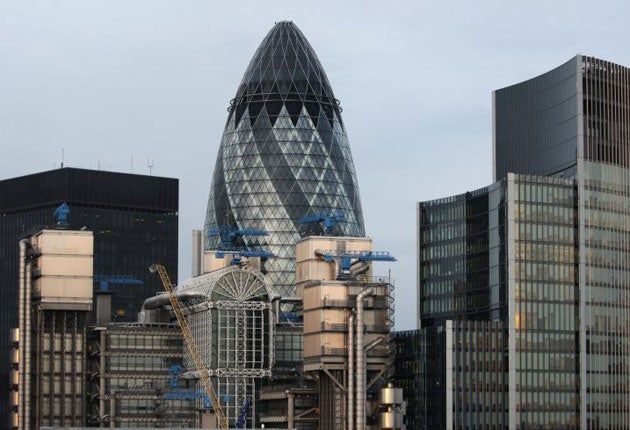Double boost for UK recovery plans

Chancellor George Osborne's recovery plans received a welcome boost today with better than expected third quarter growth figures and a crucial upgrade for the UK economy.
Gross domestic product (GDP) grew by 0.8% between July and September - less than the 1.2% surge in the previous three months, but double the growth predicted by most economists.
The data eases fears of a double dip recession and will reinforce government hopes that the private sector will pick up the slack created in the economy by mammoth public spending cuts.
Ratings agency Standard & Poor's added to the cheer by revising its outlook on the UK to stable from negative and confirming the UK's AAA rating.
Mr Osborne welcomed what he called a "double dose of good news" for the economy.
He said: "What you see today, in an uncertain global economic environment, is Britain growing, growing strongly, the strongest growth we have seen in this part of the year for a decade, and also our country's credit rating being secured.
"That is a big vote of confidence in the UK and a vote of confidence in the coalition Government's economic policies.
"I think that will underpin confidence in the recovery going forward."
The pound surged after the third-quarter figures from the Office for National Statistics (ONS), rising against the dollar and pulling back from recent six-month lows against the euro.
Sterling's bounce back comes as experts believe the surprisingly robust figures mean any further money-boosting efforts from the Bank of England will continue to remain on hold.
But they remain sceptical the UK can maintain its growth momentum as the austerity cuts kick in, while the figures are only a preliminary estimate and may be subject to change.
Economic growth over the past six months has now hit 2%, which is the fastest pace of expansion seen over two consecutive quarters for 10 years, according to the ONS.
It said that allowing for a bounce back in the second quarter following the bad weather at the start of the year, the underlying growth between July and September was actually similar to that of the second quarter.
Year-on-year growth has recovered to levels seen before the recession, reaching 2.8% in the third quarter - the highest annual rate of expansion since 2007.
The industry breakdown showed manufacturing rose 1%, services grew 0.6% while construction jumped 4% quarter-on-quarter following a 9.5% increase in the second quarter.
The rise in manufacturing took annual growth in the sector to 5.3% - its highest for 16 years - although overall industrial production output was a more muted 0.6% quarter-on-quarter.
GDP has now grown for four consecutive quarters and economists believe that even if GDP slows again in the fourth quarter, the UK is heading for growth of up to 1.8% in 2010.
This would be higher than the Office for Budget Responsibility forecast of 1.2% made for the emergency Budget.
But there are fears this will not be sustained, with Labour leader Ed Miliband yesterday accusing the Government of taking a "big gamble with growth" by pushing through deep public spending cuts so soon.
Many economists stuck by predictions for sharply slowing growth going forward.
Howard Archer, chief economist at IHS Global Insight, said he continued to believe GDP expansion will slow to 0.4% in the fourth quarter before falling further next year.
"While the data suggests that the economy had more momentum than thought in the third quarter, it does not fundamentally change our view that growth will be markedly slower going forward as economic activity is pressurised by major fiscal tightening increasingly kicking in, persistently tight credit conditions, slower global growth and significant constraints on consumers," he cautioned.
Jonathan Loynes, chief economist at Capital Economics, said today's figures made the chance of so-called QE2 action from the Bank highly unlikely at next month's meeting.
Stubbornly high inflation - currently at 3.1% - would also stay the Bank's hand, he said.
"Nonetheless, with growth set to slow and inflation worries likely to ease over the coming months, we still anticipate the need for further monetary stimulus in order to soften the blow of the coming fiscal consolidation. QE2 will probably still set sail in February," said Mr Loynes.
Despite the upbeat third quarter data, recent figures have started to reveal cracks appearing in the recovery.
Industry surveys have revealed falling confidence among firms in both the manufacturing and key services, while a weaker than expected result for retail sales in September has added to the concerns over consumer spending, with sales slipping 0.2%.
The housing market has also started to falter and Nationwide Building Society figures later this week are expected to show a 0.4% fall in property prices between September and October.
Andrew Sentance, an external member of the Bank of England's rate-setting Monetary Policy Committee, said the growth figures were "encouraging".
But he told BBC Radio 4's World at One that they bolstered the case he has been making for an early rise in interest rates.
"It's a bit of a worry that inflation has continued to run above the target when you would normally expect inflation to be pushed down by the recession.
"There is a bit of a mismatch between what's happening with inflation and growth, which we have heard about today, and the level of interest rates ...
"I am in favour of gradually moving interest rates up from their very low level which I think can be done without disrupting business or consumer confidence."
Mr Sentance also rejected suggestions that another round of quantitative easing - effectively creating new money - was needed to boost UK plc.
"We should be beginning to reduce the stimulus, not add to it," he said.
Join our commenting forum
Join thought-provoking conversations, follow other Independent readers and see their replies
Comments
Bookmark popover
Removed from bookmarks